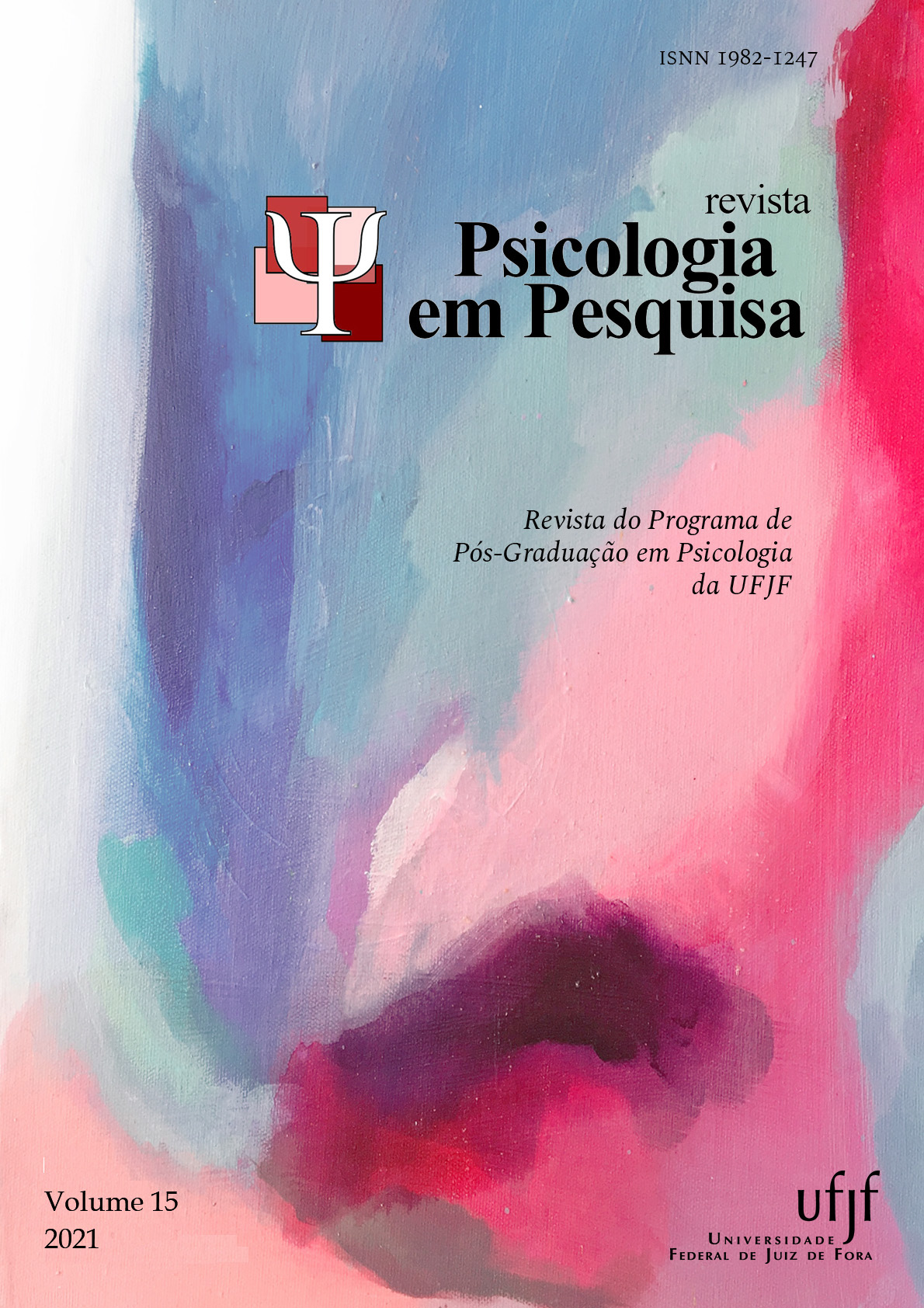“Why does my baby act like that?”
study about parent conceptions
DOI:
https://doi.org/10.34019/1982-1247.2021.v15.30709Keywords:
Infant Development, Parenting, ConceptionsAbstract
This article analyzed parental conceptions about child characteristics that most call parents' attention,
those which they have more difficulties to deal with and the factors to which these characteristics are
attributed. Twenty couples participated in the study, interviewed at the babies’ 3rd, 6th, 9th and 12th
months. The data were analyzed qualitatively. Socio-emotional skills were the characteristics that
most attracted attention. As main difficulties, mothers mentioned dealing with infant stubbornness and
fathers reported difficulties in dealing with babies' crying. Among the factors to which these
characteristics are attributed, biological and environmental aspects were mentioned. Knowing
parental conceptions about development contributes to the foundation of guidance programs for
professionals and parents in different areas.
Downloads
References
Bahia, C. C. S., Magalhães, C. M. C., & Pontes, F. A. R. (2011). Crenças de mães e professoras sobre o desenvolvimento da criança. Fractal: Revista de Psicologia, 23(1), 99-122. doi: 10.17575/rpsicol.v16i2.483
Bardin, L. (2002). Análise de Conteúdo. Lisboa/Portugal: Edições 70. (Original publicado em 1977).
Berger, S. E., Cunsolo, M., Ali M., & Iverson J. M. (2017). The trajectory of concurrent motor and vocal behaviors over the transition to crawling in infancy. Infancy, 1-14. doi: 10.1111/infa.12179
Bôgels, S. M. & Brechman-Toussaint, M. L. (2006). Family issues in child anxiety: attachment, family functioning, parental rearing and beliefs. Clinical Psychology Review, 26, 834-856. doi: 10.1016/j.cpr.2005.08.001
Brazelton, T. B. (1994). Momentos decisivos do desenvolvimento infantil. São Paulo: Martins Fontes.
Cassiano, R. G. M. & Linhares, M. B. M. (2015). Temperamento, prematuridade e comportamento interativo mãe-criança. Psicologia Reflexão e Crítica, 28(2), 416-424. doi: 10.1590/1678-7153.201528222
Castoldi, L., Gonçalves, T. R., & Lopes, R. C. S. (2014). Envolvimento paterno da gestação ao primeiro ano de vida do bebê. Psicologia em Estudo, 19(2), 247-259. doi: 10.1590/1413-737222105008
Chiodelli, T. (2016). Temperamento e prematuridade: influências sobre a interação mãe bebê. (Dissertação de Mestrado). Universidade Estadual Paulista, Bauru, São Paulo.
Karasik, L.B., Tamis-LeMonda, C. S., & Adolph, K. E. (2014). Crawling and walking infants elicit different verbal responses from mothers. Developmental Science, 17(3), 388-395.doi: 10.1111/desc.12129
Krob, A. D., Piccinini, C. A., & Silva, M. R. (2009) A transição para a paternidade: da gestação ao segundo mês de vida do bebê. Psicologia USP, 20(2), 269-291.
Legerstee, M. (2013). The developing social brain: social connections and social bonds, social loss, and jealousy in infancy. In M. Legerstee, D. Haley, & M. H. Bornstein (Eds.), The infant mind: origins of the social brain. (pp. 223-247). New York, NY: Guilford Press.
Lopes, R. C. S., Oliveira, D. S., Vivian, A. G., Bohmgahren, L. M. C., Piccinini, C. A., & Tudge, J. (2007). Sentimentos maternos frente ao desenvolvimento da criança aos 12 meses: convivendo com as novas aquisições infantis. Psicologia: Teoria e Pesquisa, 23(1), 005-016. doi: 10.1590/S0102-37722007000100002
Malhado, S. C. B. & Alvarenga, P. (2012). Relações entre o temperamento infantil aos oito meses e as práticas educativas maternas aos 18 meses de vida da criança. Estudos de Psicologia, 9, 789-797. doi: 10.1590/S0103-166X2012000500015
Marin, A. H., Martins, G. D. F., Freitas, A. P. C. O., Silva, I. M., Lopes, R. C. S., & Piccinini, C. A. (2013). Transmissão intergeracional de práticas educativas parentais: evidências empíricas. Psicologia: Teoria e Pesquisa, 29(2), 123-132. doi: 10.1590/S0102-37722013000200001
Melchiori, L. E., Alves, Z. M. M. B., Souza, D. C., & Bugliani, M. A. P. (2007). Família e creche: crenças a respeito de temperamento e desempenho de bebês. Psicologia: Teoria e Pesquisa, 23(3), 245-252.
Mendes, D. M. L. F. & Pessôa, L. F. (2013). Comunicação afetiva nos cuidados parentais. Psicologia em Estudo, 18(1), 15-25. doi: 10.1590/S1413-73722013000100003
Miguel, I., Valetim, J. P., & Carugati, F. (2009). Parental ideas and their role in childrearing: the idea-behavior connection. Italian Journal of Sociology of Education, 3, 225-253.
Piccinini, C. A., Silva, M. R., Gonçalves, T. R., Lopes, R. C. S., & Tudge, J. (2012). Envolvimento paterno aos três meses de vida do bebê. Psicologia: Teoria e Pesquisa, 28(3), 303-314. doi: 10.1590/S0102-37722012000300006
Polli, R. G., Gabriel, M. R., Piccinini, C. A., & Lopes, R.C.S. (2016). Envolvimento paterno aos 12 meses de vida do bebê. Psico, 47(3), 198-208. doi: 10.15448/1980-8623.2016.3.23205
Seidl-de-Moura, M. L., Mendes, D. M. L. F., Vieira, M. L., Kobarg, A. L., Pessôa, L. F., & Bandeira, T. T. A. (2013). Brazilian mothers’ description of their children: dimensions of autonomy and relatedness. Psicologia: Teoria e Pesquisa, 29(3), 249-255. doi: 10.1590/S0102-37722013000300002
Vygotsky, L. S. (1998). El problema del desarrollo cultural del niño. Buenos Aires: Editorial Almagesto.
Vygotsky, L. S. (2007). A Formação social da mente: o desenvolvimento dos processos psicológicos superiores. São Paulo, SP: Editora Martins Fontes. (Original publicado no Brasil em 1984).
Wu, Z. & Gros-Louis, J. (2014). Infants’ prelinguistic communicative acts and maternal responses: Relations to linguistic development. First Language, 34(1), 72-90. doi: 10.1177/0142723714521925















